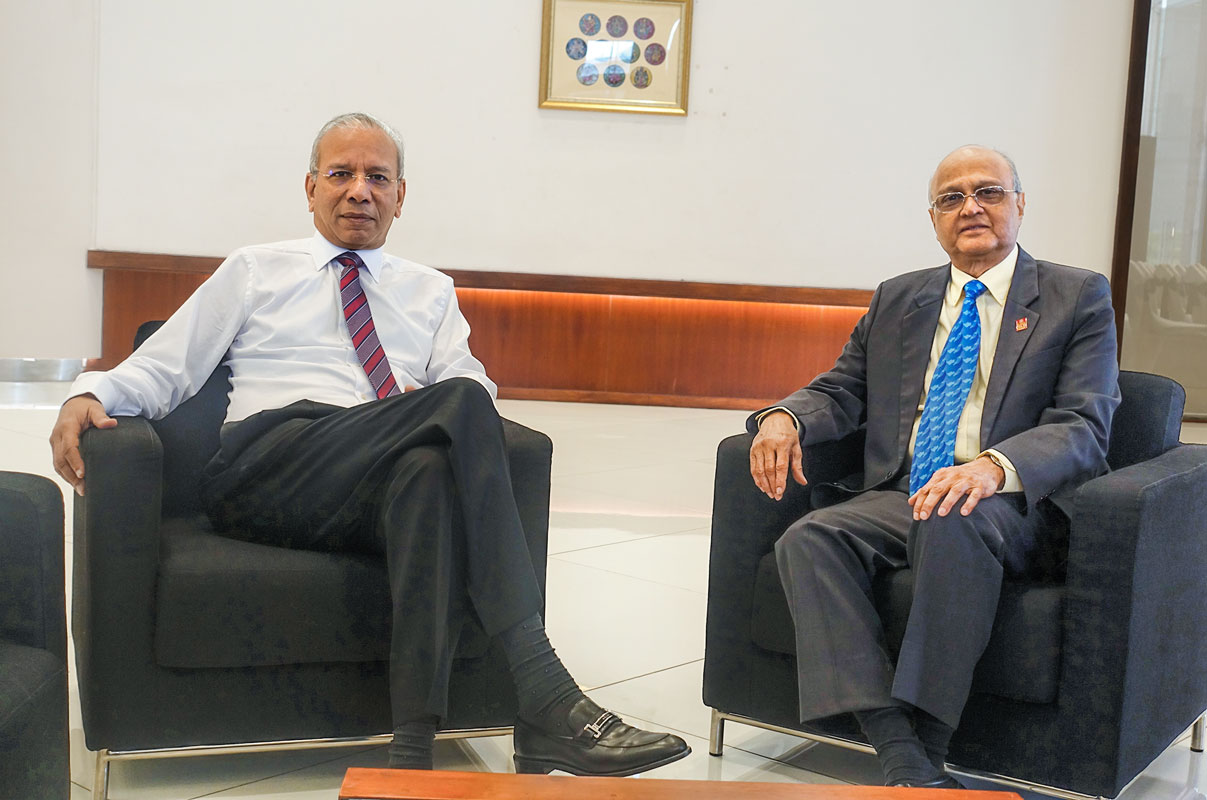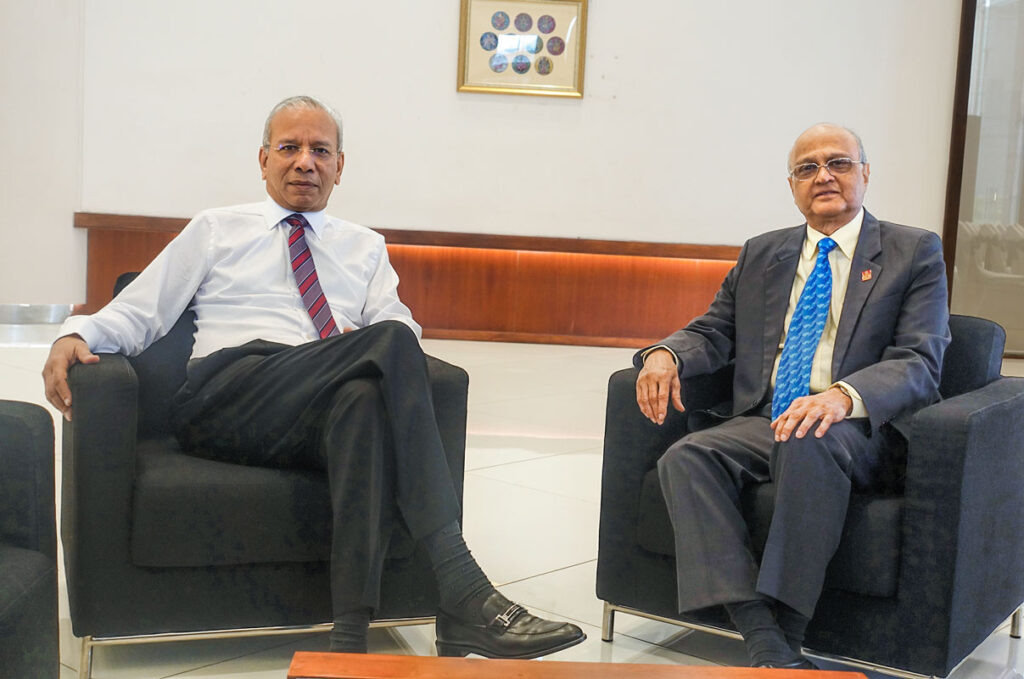As the sudden emergence of the Covid-19 virus across the world brought along with it a tornado of untold human suffering, disease and death, and Rotarians got off their feet instantaneously to render help and service in their immediate communities, The Rotary Foundation, acted quickly too.

This it did to ensure that “Rotarians could respond in a strikingly impactful and timely manner. We had an emergency meeting and made some intense and far-reaching decisions on Covid-19 related expenses,” incoming TRF Trustee Chair K R Ravindran told Rotary News in an interview.
Excerpts:
As incoming Trustee Chair can you tell us about the strategising and response The Rotary Foundation and the RI Board have come out with to deal with a special set of new challenges that the global corona pandemic has thrown up?
There was no question that nearly all of humanity was facing the biggest crisis in this generation. For the first time in its history TRF was forced to deal with a situation where the entire world was being mortally wounded by a dreadful virus. The UN’s World Food Programme warns that the number of “acutely hungry” people in the world, most of whom are in Africa, could double this year.
We received $480,000 from online contributions and $312,000 from Convention refunds to members who re-directed it to the COVID Disaster Fund.
Usually when catastrophes occur, one region of the world is affected, in which case it is possible to appeal to the unaffected regions of the world for help. But in this case, everyone was affected, and the usual big donor countries seemed to be even more deeply affected!
TRF had to react quickly and effectively. We had to react to the immediate needs and requirements of the Rotary world. More importantly, we had to react to a world which had undergone a serious trauma and a dramatically changed environment.
So what did you prioritise?
There were so many questions; but one thing was clear. We had to move fast so that our Rotarians could respond in a strikingly impactful and timely manner. We had an emergency meeting and made some intense and far-reaching decisions.
We decided to allow Covid-19 related expenses, incurred after March 15, 2020, by way of District Grants to be reimbursed through the 2020–21 Rotary year.
We agreed to waive the 30 per cent foreign financing requirement for any new global grant that was related to a Covid-19 project.
We agreed to allow districts to designate their DDF contributions to the Disaster Response Fund and request us to hold the funds exclusively for Covid-19 grant activities. This would not apply to cash contributions.
Most importantly, we immediately transferred $1 million from the World Fund to the Disaster Response Fund to be used exclusively for Covid response efforts;
We stipulated that these grants of up to $25,000 be limited to one district each, on a first come, first served basis. But we also knew that this amount would get exhausted very soon. So we quickly transferred another $2 million from the World Fund to the Disaster Response Fund for the exclusive use of Covid-19 projects again with a limit of $25,000 per district.
So these decisions were quickly made. But as physical meetings were impossible, was all this done through online meetings? And what about the RI staff participation?
Yes, these decisions were made through virtual meetings in early March/April. But the question next was how do we execute it! To begin with, we had to constantly keep in mind that the staff was working from home.
It was very impressive to hear about two global grant applications from RID 3060 (Gujarat), to supply ventilators to hospitals to treat corona cases, which were okayed in 30 and six hours; the first for a whopping ₹1.8 crore ($240,500). What kind of work/tweaking did it take for the Foundation to get off its feet and act so urgently, as the RI staff also has to work on the grant applications?
By the time we were contacted for these grant applications, the entire Rotary headquarters building in Evanston had already been evacuated. Our building was empty! But I have to compliment our staff. They did a fantastic job working tirelessly from home and clearing applications, even within a day, sometimes.
Clear skies and silent streets can come about with shocking speed, but it seems only by an act of God and at such a considerable cost.
By end-April we had approved 177 Covid-19 specific global grants for a value of approximately $1.22 million. And 193 Covid-19- specific Disaster Response Grants (the $25,000 per district ones) for a total value of approximately $4.8 million.
But I thought you said you had transferred only $3 million to this account…
True, so the surplus came from $740,000 transferred from DDF to Covid-19 grants. We received another $480,000 from online contributions given in response to our appeal and $312,000 from Convention refunds to members who re-directed it to the Covid Disaster Fund.
Going forward how do you see Rotary International and TRF responding to the post-Covid era, at least in the near future?
The whole Rotary world is in a trial that will have profound consequences on how we work and how we act as citizens and neighbours and Rotarians. We will of course be measured on our ability to handle the current adversity and uncertainty.
If we are going to save the environment and defeat future pandemics and similar calamities, then we will have to do it together.
I work very closely with President Elect Holger Knaack. Together we will do everything possible next year to deliver to all Rotarians the organisation they are looking for and will be proud of.
Globally, businesses have been affected as also salaried employees and other professionals. As incoming Chair, are you worried that TRF contributions can take a serious dip for a couple of years as countries go into an economic meltdown or recession?
You are right, businesses have indeed been affected. Companies big and small have laid off staff all over the world. Daily workers are severely affected. According to an ILO report, some 1.6 billion people around the world employed in the informal economy — or nearly half the global workforce — could see their livelihoods destroyed.
We are bound to see a surge in bankruptcies. Already some major companies like Neiman Markus, J C Penny, Hertz, Thai Airways, Debenhams, Virgin Australia are in distress.
We can see that the hospitality industry including hotels and restaurants, TV and film, sports and fitness, construction, airline and travel, retail industries are all suffering and will take some time to rebound.
On the other hand, the large digital platforms, including Alphabet and Facebook, will probably come out of the crisis even stronger. Demand for online services has exploded. Newcomers such as Zoom have become household names.
Telecommunication and pharma industries are doing well and are attracting big investments.
So logically, though we should expect membership to drop a bit and contributions to come down, I always remember that we Rotarians are truly resilient in character.
Can you please elaborate on that?
History tells us that Rotarians do behave differently. After the Spanish flu in 1918, membership actually increased by 19 per cent. After the great recession in 1921, it increased by 26 per cent; after the Asian flu in 1957, it increased by three per cent; after the Swine flu in 2009, membership did not increase. But TRF contributions went up by 20 per cent!
I must tell you though that our budget for global grants next year is actually down.
But that has nothing to with Covid-19. It has to do with what Rotarians contributed three years ago, because remember we work on a three-year cycle.
Last year, the World Fund was boosted by the heavy contributions made during our centennial year three years earlier. If contributions do come down next year, we will see the effect on that in our 2023–24 spending.
Having said that, I must also add that the funding available next year will depend, to some extent, on the return and earnings in the Foundation’s Annual Fund investment portfolio.
Obviously not even Warren Buffett can predict exactly what Rotary’s investment portfolio will earn next year.
Remember we have three categories of funds for investment — Annual, Endowment and Polio.
We invest our Endowment funds in perpetuity for long-term growth and generally in equity strategies. We are prepared to bear more risk in this portfolio. We invest to earn a return of 7 to 8 per cent over a multi-year time horizon, but we always budget more conservatively.
On the other hand, the Annual Fund is needed as part of the three-year-cycle and thus invested more conservatively.
In contrast to the past, the Annual Fund is invested to earn a modest return and thus the risk of loss is minimised, so that the Foundation can meet its funding obligations for global grants, district grants, and the costs of the Foundation and fulfill its mission. This conservative philosophy paid off when the markets crashed this year.
Our investment returns in 2019–20 on a portfolio of approximately $425 million was budgeted at 4.5 per cent, but the actual return this year will probably fall short of the budget.
For the year 2020–21 we have budgeted at a more conservative 3.5 per cent in view of the possibility of lower returns.
Polio funds are invested even more conservatively in very low risk, short-term bonds because the funding is distributed relatively quickly to our grant partners.
Environmental impact
One beneficiary of this entire pandemic is the environment. With man having receded, plants and animals are getting their rightful space on Planet Earth. In the Oct 2019 Trustees Meet (as documented by the minutes), you introduced an item asking Environment to be added as another ‘Area of Focus’. So you must be a happy man!
I did introduce a motion as you state and the Board agreed that Environmental issues must either be added as a new Area of Focus or added to an existing Area of Focus. There is a committee headed by PRIP Ian Riseley studying that aspect, and we will have a decision within this Rotary year.
But if you mean whether I am happy about the environment as a side effect of Covid–19; well I can be happy as one could ever be, under the rather difficult circumstances. Today in Venice the canals are running clear, offering glimpses of fish swimming against the current. As human activity grinds to a halt, natural rhythms resume. A similar, less visible story is being played out in the skies.
People in Punjab, say they can see the snow peaks of the Himalayas, a view that has been blocked by air pollution for years. In Colombo we are getting clear views of the sacred Adams Peak. Around the world, goats are strutting through villages in Wales, antlered deer grazing on manicured city lawns in Ohio, and mountain lions are found perched by the suburban fences in California.
In Adelaide, kangaroos are hopping around a mostly empty downtown, and a pack of jackals occupied an urban park in Tel Aviv, Israel. In Toronto foxes, deer, coyotes and exotic birds are being seen in the streets. Wild boar have descended onto the streets of Barcelona. Whales are chugging into Mediterranean shipping lanes. Hundreds of baby turtles find their way toward the water along Brazil’s northeast coast, unmolested by people or pets, unencumbered by anxiety.
For centuries, humans have pushed wildlife into smaller and smaller corners of the planet. But now, with billions in isolation and city streets emptied, nature is pushing back.
Barely a few months ago, it would have been impossible to visualise the shutting down of polluting factories and slashing emissions from travel. Now we know that clear skies and silent streets can come about with shocking speed, but it seems only by an act of God and at such a considerable cost!








